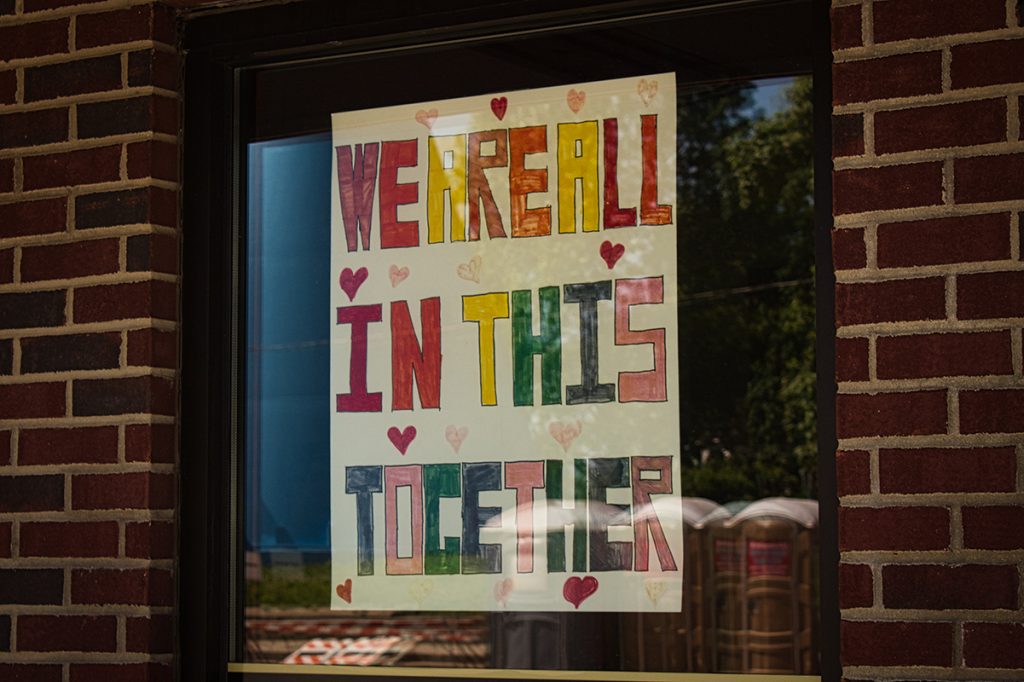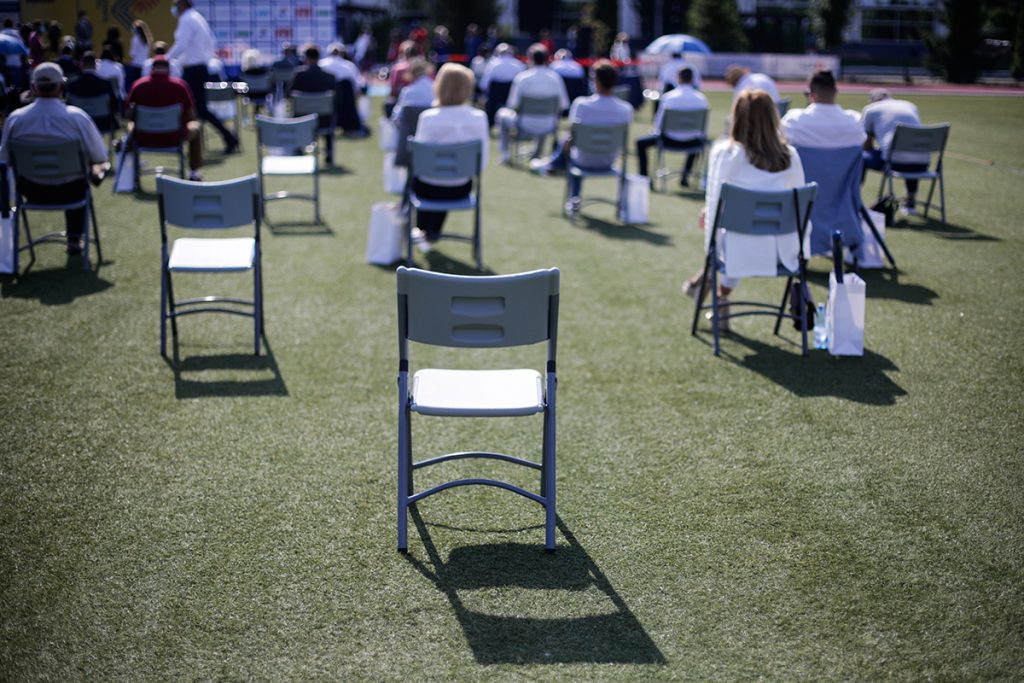God has blessed us, in this life, with seasons of celebration, even as we experience seasons of lament.
Baby showers are right expressions of joy, and are good. They celebrate God’s wonderful gift of life, and are a tangible expression of love for the new parents as they anticipate and prepare for a new life joining their family. Baby showers point us to the God as that author of lives, and the one who gives us new, and everlasting, life through Christ.
Weddings are a celebration of love and God’s mercy, and are good. They point to God’s provision of a life-long helper and partner to Adam in the Garden. They are also a picture of Christ’s love for us as His bride, and a God-ordained taste of the full and perfect joy we will experience at the marriage supper of the Lamb when we, as his bride, are perfected.
Anniversaries are a beautiful and wonderful celebration God’s faithfulness in a couple’s life, in preserving their union, just as our union with Christ, as the Church, will endure throughout eternity to come.
Graduations are joyous celebrations of the passage of a person from one stage of life into the next stage of their life. They are an acknowledgement of years of hard work toward getting that diploma, certification, or degree.
Celebrating any of these things is good and right, and is an opportunity to express gratitude to God, to share our joy with others, and to show our love for those with whom we wish to celebrate. It can be a way to celebrate God’s gifts, his mercy, and his goodness to us, sometimes in spite of great toil and effort, and sometimes BECAUSE those celebrations came after months, if not years, of uncertainty, sorrow, or hard times.
Our celebrations are a small tastes of God’s ultimate fulfillment of our desires for life, love and fruitful labor, which will be our eternity with him in the new heavens and earth, at Christ’s return. While the ultimate fulfillment of these things is as certain as though it has already happened, it hasn’t yet. For now, God has us living in a world where there is sin and brokenness, death and disease. We are not to live in fear but knowledge that all of the brokenness and death we experience in this world will be conquered by Christ at his return. At the same time we do have to live in the world, and experience these things. As such, we are still called to use wisdom and to look out for others.
In his devotional book New Morning Mercies, Paul David Trip says the following:
“He has placed eternity in each one of our hearts (Eccesiastes 3:11). Our cries are more than cries of pain; they are also cries for longing for more and better than we will ever experience in this fallen world…The diseases that infect you are to remind you that this is not paradise.” – New Morning Mercies, devotion for March 12
Because we live in a fallen and broken world in the here and now, celebrations in this life are often tinged to some extent with sorrow and lament, including missing people who can’t celebrate with us due to illness, circumstances, or because they’ve passed on to glory. Sometimes we actually experience great sorrow *while* we celebrate God’s surpassing faithfulness and mercy when we celebrate a new life, milestones, or the bringing together of two souls in love.
Life in this world often contains seasons of lament. Times when we are reminded of the fallen and broken state of world in which live, in contrast with what it should, and one day one day will be when christ returns. It seems like no season of lament has made this more painfully clear than the past year, when the COVID-19 pandemic has forced us to alter how, and at times, if, we can celebrate.
Here are a few passages that have come up in devotions, in books, or in sermons, over the past few weeks and months, that can and should speak to our relationship to pandemic guidelines, restrictions placed over us by government officials, and experts, and how our attitudes should be shaped by our understanding of what God says about how we should live as followers of Christ, before a watching world:
Loving God and Others:
“But when the Pharisees heard that he had silenced the Sadducees, they gathered together. And one of them, a lawyer, asked him a question to test him. ‘Teacher, which is the great commandment in the Law?’ And he said to him, ‘You shall love the Lord your God with all your heart and with all your soul and with all your mind. This is the great and first commandment. And a second is like it: You shall love your neighbor as yourself. On these two commandments depend all the Law and the Prophets.’” – Matthew 22:34-40
“Do we then overthrow the law by this faith? By no means! On the contrary, we uphold the law.” – Romans 21:31
“This is my commandment, that you love one another as I have loved you.” -John 15:12
“Do nothing from selfish ambition or conceit, but in humility count others more significant than yourselves. Let each of you look not only to his own interests, but also to the interests of others.” -Philippians 2:3-4
Our relationship to laws, statutes, and the governing authorities placed over us:
“In those days there was no king in Israel. Everyone did what was right in his own eyes.” – Judges 17:6
“In those days there was no king in Israel. Everyone did what was right in his own eyes.” – Judges 21:25 (it was an ongoing issue)
“Let every person be subject to the governing authorities. For there is no authority except from God, and those that exist have been instituted by God. Therefore whoever resists the authorities resists what God has appointed, and those who resist will incur judgment.” -Romans 13:1-2
Living our faith before a watching world, both on Sunday morning, as well as the rest of the week:
“Behold, I am sending you out as sheep in the midst of wolves, so be wise as serpents and innocent as doves.” – Matthew 10:16
“Keep your conduct among the Gentiles [non-believers] honorable, so that when they speak against you as evildoers, they may see your good deeds and glorify God on the day of visitation.” – 1 Peter 2:12
“you then who teach others, do you not teach yourself? While you preach against stealing, do you steal?” – Romans 2:21
“Abstain from all appearance of evil.” -1 Thessalonians 5:22
“Have this mind among yourselves, which is yours in Christ Jesus, who, though he was in the form of God, did not count equality with God a thing to be grasped, but emptied himself, by taking the form of a servant, being born in the likeness of men. And being found in human form, he humbled himself by becoming obedient to the point of death, even death on a cross.” – Philippians 2:5-8
“Woe to you, scribes and Pharisees, hypocrites! For you are like whitewashed tombs, which outwardly appear beautiful, but within are full of dead people’s bones and all uncleanness. So you also outwardly appear righteous to others, but within you are full of hypocrisy and lawlessness.” -Matthew 23:27-28
“Do not be hasty in the laying on of hands, nor take part in the sins of others; keep yourself pure.” – 1 Timothy 5:22
In light of these passages, and others, it is all the more important that members of Christ’s body seek to represent the truth of our current existence, and our coming deliverance, and God’s call on our hearts in the ways that we celebrate.
Because of these, and many other passages, we, as Christians, rightly talk about loving others more than ourselves and about seeking to emulate Christ’s self-sacrificial love for others, putting aside his glory, and his “rights” as God, to humble himself, living in relative poverty and obscurity, ultimately to die an unjust, unfair and excruciating death to redeem a people for God. We talk about the need to put aside certain liberties and “rights” for the sake of our brothers and sisters. We talk about seeking to obey God, and by extension, obeying the laws of the land and keeping a proper respect authorities God has placed over us. We rightly seek to communicate how our joy is to be found in God, and in His provision of Christ, and how our hope and joy are not to fully be found in this world, but in God, and in the world to come.
It is completely, and totally understandable that we are tempted to find ways around the rules that we’ve had to adhere to for the past year or so. However, like God’s rules for us, or speed limits, or rules about drinking and driving, or even the rules we give our children, it’s important that we each understand that there are reasons for those guidelines and not just view them as nothing more than impediment to our desires and happiness. We also need to understand the consequences of ignoring those rules, guidelines, instructions of those laws…both for ourselves, and for others around us.
In the case of COVID-19, when we give in to the temptation to ignore, or try to find ways around, the guidelines and rules for numbers at gatherings, or we refuse to wear masks, or decide we’ll obey some of the guidelines, sort of, while partially, or totally, ignoring others, or when we adhere to the guidelines only inasmuch as we are absolutely required to, but feel free to ignore those guidelines when we think those around us are okay with it, or don’t think anyone’s really watching, our actions send a message that shouts down our claims about what we believe.
There are many who have had to cancel, or drastically alter their plans for baby showers, weddings, graduation celebrations, milestone anniversaries, milestone birthdays, holiday gatherings, to make sure they avoid unnecessary risk, and follow the established guidelines. When they see us scoff at, dismiss or outright defy these same measures as overreach, unnecessary, it sends a message that we do not value what they gave up, their sacrifice is of no importance and value, that we don’t feel those same guidelines apply to us, and that what they were doing was folly or them being “controlled by fear.” In so doing we demonstrate that our desires are more important than obeying those rules and laws meant to seek to keep the virus from continuing to spread widely, more important than the other things people have had to forgo or give up, and are more important than keeping people around us safe.
This mindset also has a tendency to cause the world to equate the visible church with those who are anti-vaccine, anti-science and those who give more credence to debunked conspiracy theories than actual verified, evidence-based, peer-reviewed research by experts in their fields. Even if that’s not true of us, it can easily send the message we are part of the groups that engage in that kind of willful ignorance.
And the stakes are high. In addition to the potential spiritual affects in our own hearts, and the way our behavior can cause the world to view Christ and the Church, the stark reality is that, during a pandemic, it really can literally be (and in many cases, tragically, has been) a matter of life and death. Playing fast and loose with the rules and guidelines, because we don’t think they really matter, or really apply to our situation is, in essence, playing Russian Roulette. But sadly, it’s not just about what risk we are willing to undertake for ourselves. We then undertake that risk on behalf of everyone we come into contact with, and everyone we, or they come into contact with for the next 14 days.
It is at its root a heart issue. Even if we abide by every guideline, law, statute and recommendation, if it’s just about whether or not we are “following rules,” or checking off the right boxes to be within the constraints of the law or ordinances, and it’s not about our denying self, and putting the well-being of other’s first, and truly loving others, then it can be just as wrong. That would merely be a superficial, external veneer obedience, which does not fool God, and it doesn’t often fool those around us. I know from my own life sometimes I can be perfectly obedient (or think I am) and have a heart that is fully operating in the flesh, in pride and self-centeredness, and not in the Spirit. Ultimately our approach to this issue needs to be first and foremost about the disposition of our hearts and on what (and whom) we place the greatest importance.
Our individual, or corporate lack of diligence in faithful adherence to CDC guidelines and local and state laws concerning gatherings reveals a refusal in our hearts to acknowledge our present realities of living in a fallen and broken world. It shows our tendency as fallen people to want to skip entirely, or be in denial about the seasons of lament in which we find ourselves. We want that promised paradise now, and it doesn’t matter if we have to break rules, or skirt laws, or endanger others to do it.
And it is sin, when it happens. One helpful source for understanding what constitutes sin is this definition from the Westminster Shorter Catechism, which states,
“Sin is any want of conformity unto, or transgression of, the law of God.” – Westminster Shorter Catechism, Question 14
It bases that statement on the following scriptures:
“Everyone who makes a practice of sinning also practices lawlessness; sin is lawlessness.” -1 Jonn 3:4
“For whoever keeps the whole law but fails in one point has become guilty of all of it.” -James 2:10
“So whoever knows the right thing to do and fails to do it, for him it is sin.” – James 4:17
“For all have sinned and come short of the glory of God.” – Romans 3:23
Beyond all that we are saying to ourselves, and to others, both believers and non-believers, about our heart priorities, there’s what these actions say to God, himself, about what we believe about our relationship to him as our sovereign Creator, Lord and King, as well as his authority over us and all of creation.
In Job 38 – 43, Job has just finished bringing his “case” before God, accusing him of ignoring all of Job’s righteous deeds, and faithfulness, while allowing him to undergo terrible calamity, affliction and loss. Basically God owed him better than that, and Job is calling Him out. After Job finishes, God poses a LONG series of questions to Job, asking where he was when God laid the foundations of the earth, and created the entire universe out of nothing. This is not to shame Job as much as to remind him of who God is, and who Job is, as His creation – in essence:
“I am God, and you are not.”
At the end of this very thorough, and pointed, cross-examination, over several chapters, Job’s response is exactly what it should be, and basically amounts to this.
“I thought I knew. I did not.”
When we, relying primarily upon our own wisdom, decide that the measures put into place to help save lives, and protect us and those around us are not really necessary, are “overkill” and don’t need to be taken *that* seriously, we need to stop and check our hearts. Otherwise we may find ourselves actually being flippant, rolling our eyes at it, deciding that finding ways around the rules is okay and justifiable, and in some cases, may go as far as actually refusing to follow the laws and guidelines, entirely. When we find our hearts wandering in this direction, it wouldn’t be too much of a stretch to put forth the following pointed questions to our own hearts, to check ourselves:
1. Where were we when God created the virologists, epidemiologists, and others scientists and experts working hard to understand this new virus and using that knowledge to creating these guidelines, and warning us of the potential for harm and death if we do not adhere to them.
2. Where we were when God gave them the intellect and wherewithal to devote years, if not decades to studying how viruses work, so that they could apply that knowledge to this new virus.
3. Did God forget to consult us when placing the governor of our state over us?
4. Where were we when God arranged things so that these doctors, scientists, and government officials would be in the positions they are in to advise us to help save lives during this pandemic?
5. When did God bless us with scientific and medical knowledge that surpasses that of the people God preordained to have advanced degrees and decades of experience and research into virology, epidemiology and how to address pandemics for such a time as this?
6. Where did we each do our undergraduate work in biology, premed and microbiology?
7. When did we each complete our graduate studies in epidemiology and virology? And where did we do our residency to complete those degrees?
8. Do any of us without such degrees, research experience, and field experience honestly believe that God has gifted us with greater intellect and understanding than he has granted to those whom he has placed in these positions.
9. Do we believe that intellect and understanding granted in God’s providence to those men and women is nullified because we saw an article, or video, often produced by laypeople or people with dubious credentials and resume claims, primarily because it better fits with what we want to believe about what is to be expected of us?
Again, weddings are good. Celebrating birthday are good. Anniversary celebrations are good. Sharing joyous moments and events with friends and family is a beautiful and God-honoring thing, and there is nothing wrong with desiring to celebrate those days to the fullest. That is a desire put in our hearts by God himself. However, seeking to celebrate those glorious things in ways that ignore our present realities, which break rules, health guidelines, and even laws, endangering ourselves and those around us, turns a blessed and sacred expression of God-honoring joy into something that does not in any way honor God, or the people with whom we seek to celebrate. It reveals that those good things have become idols in our hearts because it makes our day, our desired plans, our event, our enjoyment, our desire to be unencumbered by guidelines, rules and precautions to be paramount, over other people’s health and safety, over the safety of those they’ll encounter in the next couple of weeks, and over our call to look out for others and obey the authorities placed over us by God. When we do so, it shouts down anything we have to say we believe about caring about and loving others, and putting others and God first. It directly contradicts our claims that we want to honor God with our actions and how we live our lives.
Our faith should inform not just what we believe about God, Christ and the Bible, but should also inform how we live, lament and yes, even how we celebrate God’s good gifts. May we all seriously consider God’s call on our hearts and lives as we make decisions in the coming weeks, and months, if not longer, and repent where appropriate, so that we may truly exemplify God’s love and the Gospel, as well as glorify his holy name in word *and* deed.




